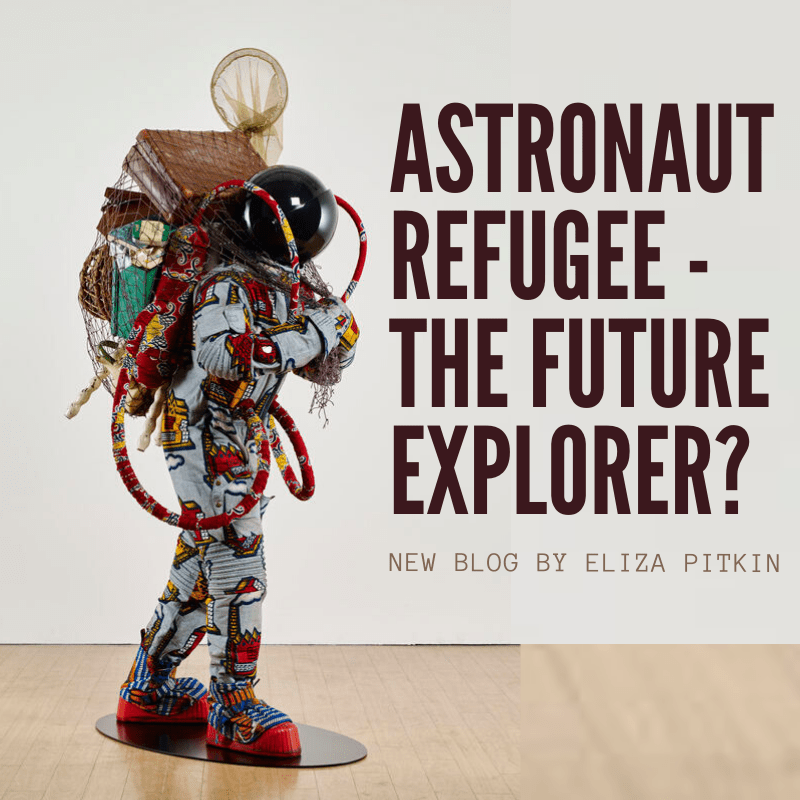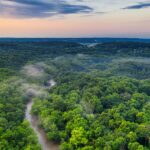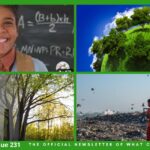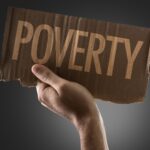‘We Do Not Inherit the Earth from Our Ancestors; We Borrow It from Our Children’
– Native American Proverb
I recently visited the ‘Wellcome hub’ at Euston, they had a free exhibition called ‘What it is to be human.’ It was a small collection of artworks and interpretations around the fundamentals of being human. One particular piece was a sculpture by a British Nigerian artist called Yinka Shonibare, the sculpture was a refugee astronaut, wearing a spherical helmet, moon boots, a one-suit made from Dutch fabrics, tubes for an oxygen tank and a netted backpack full of possessions. This piece stood in the middle of a spacious gallery and was undeniably engaging and at the same time incredibly haunting. This explorer seemed to be a reflection of ourselves in a dystopian interpretation of what’s to come. I think this is made abundantly clear when the sculpture is faceless, we can easily put ourselves in that situation. The artist has since discussed how it was related to rising water levels and the displacement of people.
With the spacesuits and traveller items, it reminds you of the nostalgic adventure stories of conquerors’ discoveries and intergalactic space travel. Images such as the flag on the moon, The Famous Five, Gulliver’s travels and Columbus all come to mind. The artist even included a NASA badge on the shoulder of the astronaut. However it’s contrasted with fabrics that are reminiscent of Africa, a fashion of cultural heritage. Something is exciting and child-like about its references yet there is nothing is exciting about this figure. What came to my mind was America, the land of ‘opportunity’ with its more capitalistic and individualist nature. The traditional perception of an ‘explorer’ and colonialism has generally been a white endeavour, usually reclaiming land that wasn’t theirs to claim. This is still an attitude shared by many around the world.
When we live in a first-world country, where we have access to a laptop to read a blog about climate change it is digestible, we can sit in and have time to form an opinion. But everything that we do here; every single-use plastic we throw in the bin affects our neighbours on the other side of the globe. One thing that particularly stands out is the jumble of possessions including a family photograph, binoculars, tinned food and classic literature amongst other things. Some items necessary for a journey and others for sentimental value. It was as if this person grabbed the most important things before an emergency escape from their home. The artist himself said, “It’s not immediately graspable. That’s why things are very slow politically. People see they can still get their breakfast. It doesn’t feel urgent. Whereas if you’re in a war situation you can see your house being destroyed and that you have to respond very quickly.*” It can’t help but make you think that everything else we own is just unnecessary clutter, just an extra, just greed.
We have to face it, the “modern-day explorer” is a refugee. Except they’re not trying to ‘discover’ or conquer new land but instead re-habitat to a place of safety when their home has been destroyed. The ‘future’ explorer will be our children that are trying to survive on a planet that is no longer safe or natural. We can already see the early stages of this now. For example, there have been growing numbers of people suffering from asthma as pollution causes a huge threat to respiratory health along with airway inflammation and damage to lung tissue amongst other diseases*.
As I see it, the planet itself is all land with just lots of water between us. We share the sun, the water and the air we breathe. But we have polluted our oceans and air, for what? Those extra items? This idea of nationalism, borders, and walls, is the attitude of fear; the fear of losing one’s own identity, the fear of sharing, the fear of change. When there is fear, there is a perfect place for bad decision-making and ultimately destruction. The idea of identity is to limit oneself to an idea when your identity can be redefined to one that is part of this natural world and we should treat it and everything in it with more respect and humility.
We are so much more than the borders we were born within, we’re all nomads and wonderers, we are all exploring the land and experience of life itself. Perhaps it’s a more spiritual outlook but if we see ourselves as one race; the human race; then we see ourselves as part of a bigger idea; we are everyone and everything. We can operate within this beautiful planet by only taking what we need, being more responsible for our decisions and taking care of ourselves and each other a lot better, I know we can. It all starts with you, and then slowly we’ll steer further away from this dark representation of our future.
Blog: Eliza Pitkin
December 2019
*Interview with Yinka Shonibare https://wellcomecollection.org/articles/XYofFREAACQAp-Vl
*Amato G, Cecchi L, Amato M, etct. Climate change and respiratory diseases. European Respiratory Review. 2014; 23(132):161-69.
*Amato G, Cagani Ca, Cecchi L, etc. Climate change, air pollution, and extreme events leading to increasing prevalence of allergic respiratory diseases. Multidisciplinary Respiratory Medicine.2013:12 http://www.ncbi.nlm.nih.gov/pmc/articles/PMC3598823/pdf/2049-6958-8-12.pdf







